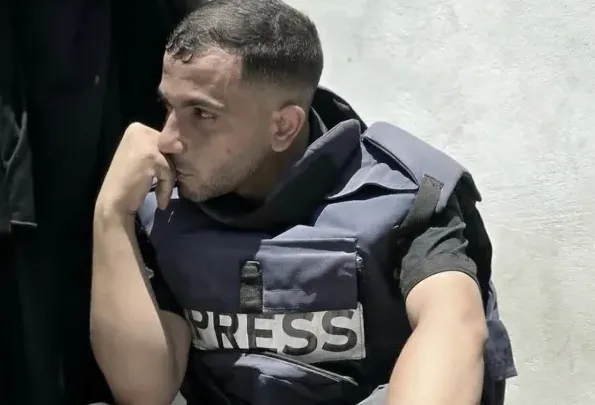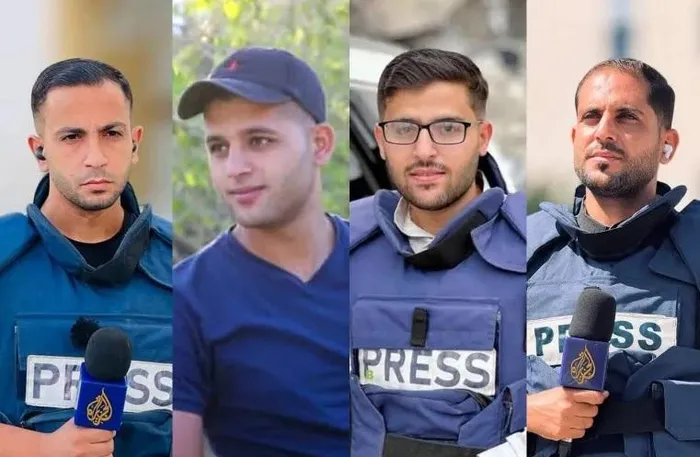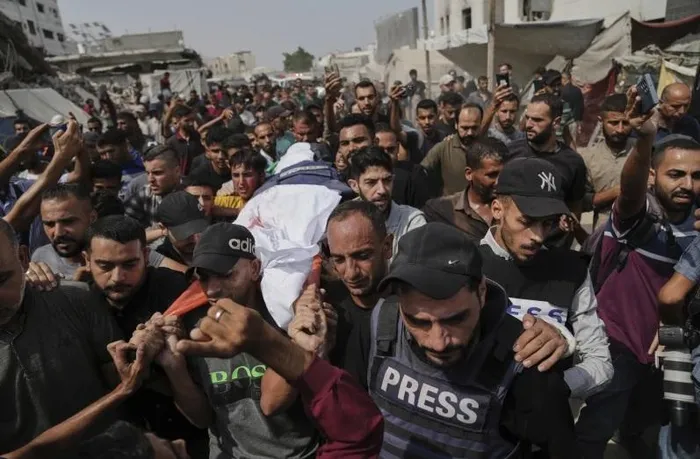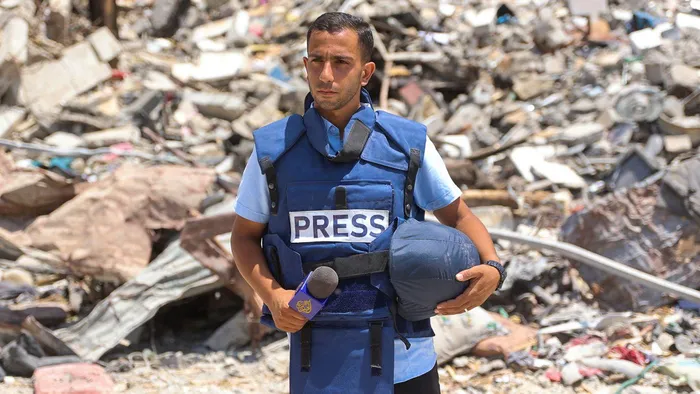Palestinians mourn Al Jazeera journalist Anas al-Sharif, crew in Gaza

Journalist Anas al-Sharif was one of the key voices reporting the suffering in Gaza.
Image: Al Jazeera
Louisa Loveluck and Abbie Cheeseman
Palestinians in Gaza this week mourned the deaths of five Al Jazeera journalists killed in an Israeli strike on Sunday. In Gaza City, crowds carried the bodies of correspondent Anas al-Sharif and his colleagues, who for many across the Arabic-speaking world were the faces and voices of the past 22 months of war.
Sharif, 28, was perhaps the most recognizable, with a near-constant on-air presence from Gaza’s hard-hit north. He was killed late Sunday when the Israeli military targeted a tent housing the journalists outside al-Shifa Hospital in Gaza City. The strike also killed reporter Mohammed Qureiqa, and cameramen Ibrahim Thaher, Mohammed Noufal and Moamen Aliwa, the network said, calling it a “blatant and premeditated attack on press freedom". All of them worked for Al Jazeera Arabic, the network’s Arabic-language news channel.
The Israel Defense Forces confirmed the strike and baselessly accused Sharif of serving as the head of a “Hamas terrorist cell". It cited documents dated from 2019, which it released in October 2024, claiming to show his affiliation with the militant group.
The IDF has not shared or released any documentation indicating Sharif was involved in military activities during the current conflict and it has not accused any of the other slain journalists of ties to militants. When asked about the others killed in the strike, the IDF said that it had no further comment.
Al Jazeera, the Committee to Protect Journalists and a United Nations expert have said that the documents released by the IDF, which accused six other Al Jazeera journalists of being Hamas militants, are not credible.
For months, Sharif was harassed by the military on his personal cellphone, his colleagues said, and the threats increased after the IDF’s Arabic-language spokesman singled him out in videos the military posted in July.
In one clip, Avichay Adraee accuses Sharif of having ties to Hamas’s military wing, while working for Al Jazeera, which he describes as “the most criminal and offensive channel". In another, Adraee mocks Sharif’s reporting on starvation in Gaza, calling the July 20 broadcast in which he cried “a fabricated drama.”
As the threats poured in, Al Jazeera urged him to stay close to the media tent near al-Shifa Hospital. “We took the hard decision to keep Anas on air because it felt like the only guarantee, that they would not kill him while he was on Al Jazeera’s screens,” said Mohamed Moawad, the network’s managing editor.

Four of the slain journalists, from left: Anas al-Sharif, Mohammed Noufal, Ibrahim Zaher and Mohammed Qreiqeh.
Image: Al Jazeera
Israel has blocked independent media access to the Gaza Strip throughout the war, leaving Palestinians alone on the ground to cover the conflict. Israel targeted the Al Jazeera team as Israeli forces were preparing to invade and occupy Gaza City, after the security cabinet approved a plan to expand operations last week. In posts to social media less than an hour before his death, Sharif shared footage of what he said were “fire belts” - heavy, concentrated air and artillery strikes, normally around a single location.
That timing made the strike on Sharif a “convenient killing,” said Irene Khan, the UN special rapporteur for freedom of opinion and expression. “If something comes out in Al Jazeera, people believe it; it’s credible,” she said. “I see this killing as a very clear strategy. The Israeli government has a very sophisticated communications machinery.”
More than 61 000 Palestinians have been killed by Israel’s campaign in Gaza, according to the Gaza Health Ministry, which does not distinguish between civilians and combatants, but says the majority of the dead are women and children. Israel launched the war after the Hamas attacks on Oct. 7, 2023, which killed about 1,200 people and saw about 250 others taken to Gaza as hostages.
After Sunday’s strike, the Committee to Protect Journalists said that at least 184 Palestinian journalists had been killed since the start of the conflict. The organisation had warned less than three weeks ago that it was “gravely worried” about Sharif’s safety and called for the international community to protect him, saying he was being “targeted by an Israeli military smear campaign” that he believed would be “a precursor to his assassination".
“It is no coincidence that the smears against al-Sharif - who has reported night and day for Al Jazeera since the start of the war - surfaced every time he reported on a major development in the war,” CPJ regional director Sara Qudah said.
“Israel is murdering the messengers,” she said. “Israel wiped out an entire news crew. It has made no claims that any of the other journalists were terrorists. That’s murder. Plain and simple.”

Palestinians carry the body of Al Jazeera correspondent Anas al-Sharif, who, along with other journalists, was killed in an Israeli airstrike, during his funeral outside Gaza City’s Shifa hospital complex, on Monday.
Image: AFP
In the hours before Sunday’s strike, the Palestinian ambassador to the UN, Riyad Mansour, addressed an emergency meeting at the Security Council, which had gathered to discuss Israel’s plans to take over Gaza City.
He urged the council’s member states to send journalists from their countries to Gaza, after Israeli Prime Minister Benjamin Netanyahu, at a news conference in Jerusalem, claimed without evidence that some of the recent images of malnourished children in Gaza were “fake".
“Why don’t you, the Security Council, take with you 100 journalists from your countries and other countries to verify exactly what is happening in Gaza,” Mansour said. “If Netanyahu is so sure of this global conspiracy about a ‘lie,’ let him prove it.”
Khan, the UN rapporteur, said that she had also urged governments around the world to increase pressure on Israel to protect Palestinian journalists and allow independent media access to Gaza.
“On the one hand, Israel keeps saying that all the local media are Hamas; on the other hand, they’re blocking international media,” she said. “Media exposure is a public interest issue. It matters to all of us.”
Sunday’s strike underscored the perils faced by the Palestinian journalists left to shoulder the burden of reporting Gaza’s excoriation, reporting through hunger, displacement, trauma and the loss of family members. They often shared meals and stayed together in tent encampments near Gaza’s hospitals, after most of the enclave’s buildings were either damaged or destroyed.

Journalist Anas al-Sharif reporting outside the Al Ahli hospital this year.
Image: AFP
As soon as the missile hit about 11.30pm local time, journalists began recording the aftermath on their phones. In one video, people can be heard screaming the names of Sharif and Qureiqa as their bodies are pulled from under what was left of the tent.
Al Jazeera English correspondent Hani Mahmoud spoke soon after the attack. He said that delivering the news of the journalists’ deaths was “perhaps the hardest thing I’m reporting about the past 22 months.” Mohamed Abu Salmiya, director of al-Shifa Hospital, said that a total of seven people were killed in the strike, six of them journalists.
Tributes to the team and outrage over their deaths flooded social media. “Anas and his colleagues were among the last remaining voices from within Gaza, providing the world with unfiltered, on-the-ground coverage of the devastating realities endured by its people,” Al Jazeera Media Network said. “While international media was barred from entering, Al Jazeera journalists remained within besieged Gaza, experiencing the hunger and suffering they documented through their lenses.”
Al Jazeera viewers have watched Gaza’s horrors unfold through Sharif, who became a household name. Earlier this year, he celebrated a ceasefire - which Israel broke two months later - by removing his helmet and flak jacket.
In another widely shared video from last month, he was seen struggling to maintain composure - and pauses live on air, tears in his eyes and a crack in his voice - when a woman fainted of hunger nearby. “Persist Anas, you are our voice,” a passerby said to him, before he continued reporting.
In the hour after the strike, a post appeared on Sharif’s social media: He had written a final message in the event of his death.
“Should these words find their way to you, know that Israel has succeeded in ending my life and silencing my voice,” it began.
“From the depths of my heart, I have dedicated every effort, every ounce of strength, to be a steadfast support and a vocal advocate for my people … I have stood firm in my commitment to convey the truth as it is,” he wrote. “I call upon God to bear witness against those who chose silence, those who accepted the violence against us, and those who turned a blind eye to the anguish of our children and women.”